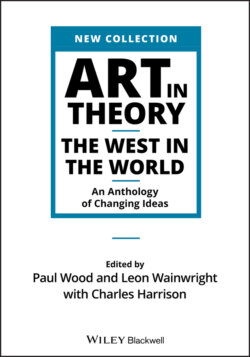Читать книгу Art in Theory - Группа авторов - Страница 104
IIA6 John Shebbeare (1709–88) ‘The taste of England at present …’
ОглавлениеJohn Shebbeare was an eighteenth‐century political writer. His Tory sympathies led him to publish a series of satires against the Whigs and the Hanoverian dynasty with whom they were associated. His Letters on the English Nation used the device of a series of letters by a fictional author to criticize contemporary social mores, much as Montesquieu had done in the Persian Letters. Shebbeare’s fictional author was ‘Batista Angeloni’, a Jesuit with long experience of English life. The fifty‐sixth of his 59 ‘Letters’ concerned ‘The taste of England at present in architecture’. It is in essence a critique of the all‐pervading fashion for things Chinese. Chinoiserie was often identified with ‘effeminacy’ in taste, and something of this leaks through into Shebbeare’s defence of the ‘simple and sublime’, that is to say, the classical achievements of the seventeenth century. Paradoxically, for him the affectations of the ‘Grand Tour’ seem to have weakened a true appreciation of the classical, and opened the door to the caprice of Chinoiserie and the Gothic. The extracts are from Letters on the English Nation, vol. 2, London, 1756, ‘Letter LVI’, pp. 259–64.
How few of those men of taste who have travelled Italy, have ever studied the human body; it is cloathed and concealed, and almost impossible in the common ways of life to be seen frequently and with attention; notwithstanding this, in every painting and piece of sculpture, they set themselves forth as just judges of every human figure, which can never be obtained but from the thorough consideration of many living bodies.
But to waive all examination of the power of judging of those things which are known by comparison, and where the originals are concealed from proper inspection, let us see how much these travellers have improved the taste of this nation, by their perigrinations: in architecture, Inigo Jones, and Sir Christopher Wren have been excellent, the first equal perhaps to any man amongst the whole list of these artists; and perhaps at that time the four greatest men in the world in point of genius were natives of and resided in this island, Verulam, Shakespeare, Hervey, and Jones … It was then, genius seems to have been most prevalent in this isle, from which time it has declined, and that taste which was its companion, is lost entirely. […]
The simple and sublime have lost all influence almost every where, all is Chinese or Gothic; every chair in an apartment, the frames of glasses, and tables, must be Chinese: the walls covered with Chinese paper filled with figures which resemble nothing of God’s creation, and which a prudent nation would prohibit for the sake of pregnant women.
In one chamber, all the pagods and distorted animals of the east are piled up, and called the beautiful decorations of a chimney‐piece; on the sides of the room, lions made of porcelain, grinning and misshapen, are placed on brackets of the Chinese taste, in arbors of flowers made in the same ware, and leaves of brass painted green, lying like lovers in shades of old Arcadia.
Nay, so excessive is the love of Chinese architecture become, that at present the fox‐hunters would be sorry to break a leg in pursuing their sport over a gate that was not made in the eastern taste of little bits of wood standing in all directions; the connoisseurs of the table delicacies can distinguish between the taste of an ox, which eats his hay from a Chinese crib, a hog that is inclosed in a stye of that kind, or a fowl fattened in a coop the fabric of which is in that design, and find great difference in the flavour. […]
To my unpolite ears, the airs which are sung at present have no longer the imitation of any thing which would express passion or sentiment, and the whole merit lyes in the Gothic and Chinese closes and cantabiles, frithered into niceties and divisions, which, like minute carvings, are the certain characteristics of a little taste, that delight more in difficulties than truth … The Chinese taste is so very prevalent in this city at present, that even pantomime has obliged harlequin to seek shelter in an entertainment, where the scenes and characters are all in the taste of that nation.
